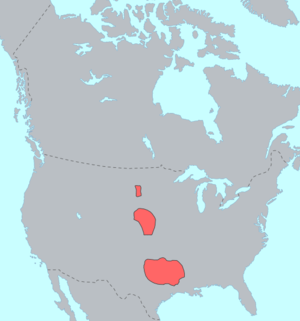Caddoan languages
| Caddoan | |
|---|---|
| Geographic distribution: |
Great Plains, North America |
| Linguistic classification: | One of the world's primary language families |
| Subdivisions: |
|
| ISO 639-5: | |
| Linguasphere: | 64-B |
| Glottolog: | cadd1255 |

Caddoan languages
|
|
The Caddoan languages are a family of Native American languages. They are spoken by Native Americans in parts of the Great Plains of the central United States, from North Dakota south to Oklahoma.
Five languages belong to the Caddoan language family:
The Kitsai language is now extinct, as its members were absorbed in the 19th century into the Wichita tribe. All of the other Caddoan languages are critically endangered; Caddo is now spoken by only 25 people, Pawnee by 20, and Arikara by three. The last native speaker of Wichita, Doris McLemore (who left recordings and language materials), died in 2016. Caddo and Pawnee are spoken in Oklahoma by small numbers of tribal elders. Arikara is spoken on the Fort Berthold Reservation in North Dakota.
Speakers of some of the languages were formerly more widespread; the Caddo, for example, used to live in northeastern Texas, southwestern Arkansas, and northwestern Louisiana, as well as southeastern Oklahoma. The Pawnee formerly lived along the Platte River in what is now Nebraska.
is a controversial method of reconstructing in broad detail the history of a language and its relationships. In the case of proto-Caddoan it appears that it divided into two branches, Northern and Southern, more than 3,000 years ago. (The division of the language implies also a geographic or political separation.) South Caddoan or Caddo proper evolved in north-eastern Texas and adjacent Oklahoma, Arkansas, and Louisiana. Other than Caddo, no daughter languages are known, although some probably existed in the 16th and 17th century but were not recorded.
...
Wikipedia
